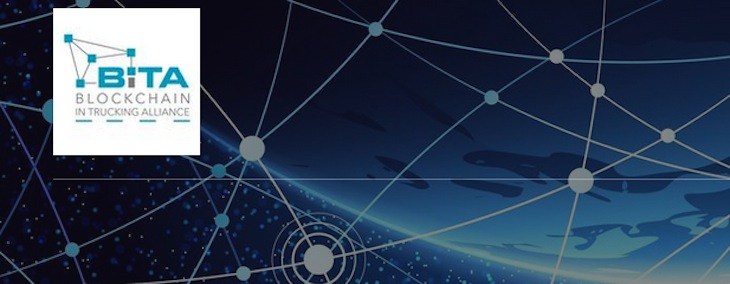Blockchain might lead to faster payments, fewer disputes in trucking industry
by October 31, 2017 5:29 pm 595 views

A digital ledger known as blockchain might speed up transactions and decrease disputes between shippers and carriers as it creates a step-by-step log of a shipment within the supply chain, but the technology likely won’t be widely used for at least three to five years.
Blockchain, which has been discussed since at least 2009, is a software allowing for information to be stored on a central ledger that’s distributed throughout a network and cannot be edited, said Craig Fuller, CEO of TransRisk, a financial company for the trucking industry. Fuller is also co-founder of the Blockchain in Trucking Alliance (BiTA), representing more than 200 companies in trucking and logistics and working to develop blockchain standards for the industry. The organization was formed nearly two months ago to bring together technology companies, startups and trucking and logistics companies.
In a conference call, The Blockchain in Trucking Revolution, hosted by Stifel, Fuller and Chris Burruss, president of BiTA, explained the technology and its impact on the trucking industry.
The value of blockchain is that “you don’t have to trust a central party,” such as a bank or government organization, Fuller said. The transactions within blockchain would be paid with a cryptocurrency, such as Bitcoin. The alliance is not launching a cryptocurrency, but Fuller expects to see a cryptocurrency to become the currency of choice within blockchain.
“The theory is that the blockchain enabled supply chain participants will be able to handle transactions, more quickly, more securely, with fewer errors and less labor cost involved in the overall process,” according to John Larkin, trucking/transportation analyst for Stifel. “Disputes can be automatically arbitrated and, upon satisfaction of smart contract conditions, cash can flow from one party to another however quickly supply chain participants agree that it should.”
Historically, agreements were made on a handshake and enforced by whomever had the biggest stick, Fuller said. Over time, institutions and governments would be charged to enforce them. With blockchain, technology would enforce agreements. A digital contract could be set into place with everyone involved in the contract having the same set of information. When the terms of the contract are met, the digital contract could automatically provide payment to the one providing the service.
“No need to file a claim,” Fuller said. “Money can be moved electronically. There is no collecting process.”
This could eliminate disputes, and mitigate fraud, he said. A shipper would know if the truck picked up the shipment on time. A broker could determine when an independent contractor accepts a shipment and arrives to pick it up. Blockchain would create a “bread crumb record” of a “farm-to-fork” shipment, allowing all participants to know everyone who touched a shipment, especially in the event of a recall.
“These massive recalls are very expensive for shippers.”
Blockchain might not have been able to prevent the e-coli outbreak that Chipotle experienced, but it could have been used to “more rapidly trace the source(s) of outbreaks,” according to a Blockchain for Transportation: Where the Future Starts. “The shared behavior of the blockchain allows organizations to not only track products within their control but also across vendors participating in the transaction, thus providing a 360-degree view to business stakeholders.”
Some of the data sources blockchain could capture “in an unalterable format for posterity” include tractors, trailers, ELDs, odometers, warranty work and vehicle servicing, according to Larkin.
One the issues with blockchain is the speed of the technology, which allows three to 20 transactions per second, compared to a credit card company which processes 56,000 transactions per second. Another is the privacy concern, especially in light of the Equifax hack. With blockchain, a private ledger allows only the participants of a transaction to have access to the information. Also, blockchain would not require a central arbitrator, like a credit card company.
Burruss said the technology might impact factoring companies, to which a company sells outstanding invoices at a discounted rate in order to increase cash flow. But they might have a role in blockchain as they could accept a dollars payment from a shipper that’s transferred into cryptocurrency and paid out to a carrier in dollars. Fuller expects a cryptocurrency will eventually “win out” and become the “standard of the industry.”
Burruss said members of the Blockchain in Trucking Alliance are involved in 85% of trucking transactions.
“We’re bringing together elements across the supply chain,” he said, emphasizing the importance of each carrier “not doing their own thing” to improve the efficiencies within the blockchain system.
Burruss also said the alliance is partnering with a third party to develop standards and is set to meet in November in Atlanta. However, the alliance isn’t a technology company and won’t develop applications, but it is bringing together the companies that would, Fuller said.
“It’s more about the coding that’s going to be used,” Burruss said. “The systems have to be able to meld.”
Fuller said he’s seeing startups starting to test blockchain with customers, but expects it will be between three and five years before “it’s commonly accepted across the landscape.”
